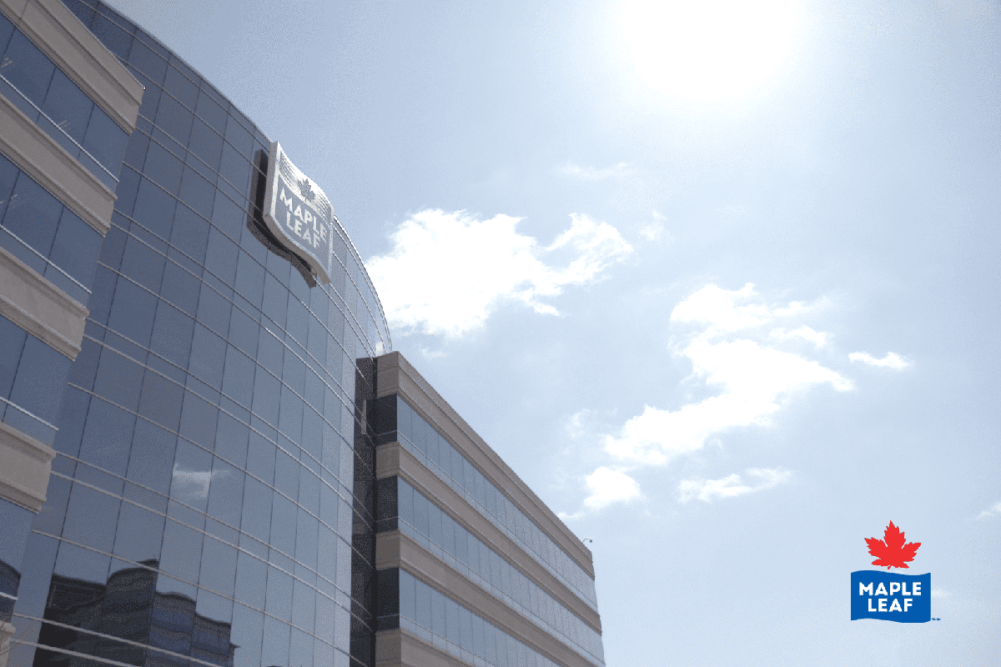MISSISSAUGA, ONTARIO — Maple Leaf Foods Inc. released its second annual Integrated Report on April 30, which details the company’s financial performance as well as goals and progress toward caring for its workers, communities and environment.
Reflecting on his first year as chief executive officer for Maple Leaf, Curtis Frank wrote in his letter to stakeholders, “Perhaps our proudest accomplishment is that throughout a year of intense transition and disruption, our commitment to creating shared value for all our stakeholders has been unwavering. We worked hard as a team to stabilize the financial performance of our business, realize the benefits of our recent capital investments and put the right plans and people in place to capitalize on the platform we have built for the future.”
Maple Leaf employs approximately 13,500 people and does business primarily in Canada, the United States and Asia.
Caring for its employees is a key priority at Maple Leaf. In 2023, the company completed social compliance audits at its five largest facilities and moved forward with an enhanced social compliance program. Maple Leaf announced plans to launch an independent third-party human rights impact assessment focusing on migrant workers within its workforce.
Regarding worker safety, in 2023, Maple Leaf had zero fatalities, a trend that has continued for more than a decade. Over 30 of its sites had zero recordable injuries last year. Maple Leaf achieved a Total Recordable Incident Rate (TRIR) of 0.40, a 93.6% improvement from its 2012 baseline year.
In line with Maple Leaf Foods’ Diversity and Inclusion Blueprint, the company developed new, impactful goals to advance diversity, promote equity and maintain an inclusive culture within the organization. A couple added goals include increasing the number of women and Black, Indigenous and People of Color (BIPC) in management by 2030.
Last year, the Maple Leaf Centre for Food Security celebrated its seventh anniversary, having committed over $12.4 million to 33 initiatives that address underlying drivers of food insecurity. The center joined several Canadian foundations to provide funding for Ontario’s Student Nutrition Program and First Nations Student Nutrition Program. Along with funds provided by the Government of Ontario, this effort contributed $5 million towards school food programs in the province.
Maple Leaf employees demonstrated the company’s values of enhancing community well-being by volunteering across over 40 communities across Canada through the company’s Raise the Good in the Neighborhood program. Employees volunteered at local food banks, in healthcare institutions and hospitals, for local community centers, with newcomer services and more.
Maple Leaf completed a transition of its Ontario poultry processing operations to a new, world-class London Poultry facility. As part of this transition, the company now uses controlled atmosphere stunning for all of the poultry it processes. Maple Leaf’s poultry processing facilities are now all equipped with modular loading, environmentally controlled indoor lairage and technology that eliminates the need to handle birds before they are rendered insensible.
Maple Leaf Foods remains committed to the elimination of gestation stalls for sows, and 100% of the company's owned sow spaces meet open sow housing standards in accordance with the National Farm Animal Care Council (NFACC) Code of Practice and Canadian Pork Excellence PigCARE program.
Additionally, Maple Leaf Foods is committed to reducing the use of antibiotics in its animals while ensuring animals receive treatment when needed to protect their welfare. Since 2014, the company has reduced antibiotic usage by 99.3% across its owned hog production operations.
As part of its commitment to better food, the company launched a new Maple Leaf Natural Selections offering last year, featuring deli meats with its simplest ingredients ever. Maple Leaf looked to simplify packaging as well and increase the legibility of claims.
Maple Leaf set zealous targets in 2015 to reduce its environmental footprint by 50% by 2025. Its goals covered electricity, natural gas, water, solid waste, and food loss and waste.
“While Maple Leaf Foods has made progress across these areas, the pace of progress has been hampered by a number of factors, including the impact of the global pandemic which delayed a number of initiatives, as well as the timing of ramping up its new facilities and the lag in decommissioning associated legacy plants,” Maple Leaf said. “The company recognizes the challenges associated with setting aggressive science-based targets and is committed to transparent updates on its progress towards these sustainability goals.”
Maple Leaf was a founding member of the Canadian Alliance for Net-Zero Agri-Food (CANZA) in 2023. CANZA is committed to driving sustainable outcomes in Canada's agri-food sector by collaborating with farmers.
Maple Leaf continued its partnership with Nutrien, a leading provider of crop inputs, for the fourth consecutive year to expand regenerative agriculture efforts. Maple Leaf has doubled its investments in regenerative practices year over year for the past three years and has scaled its efforts from 19,000 acres to 160,000 acres.

